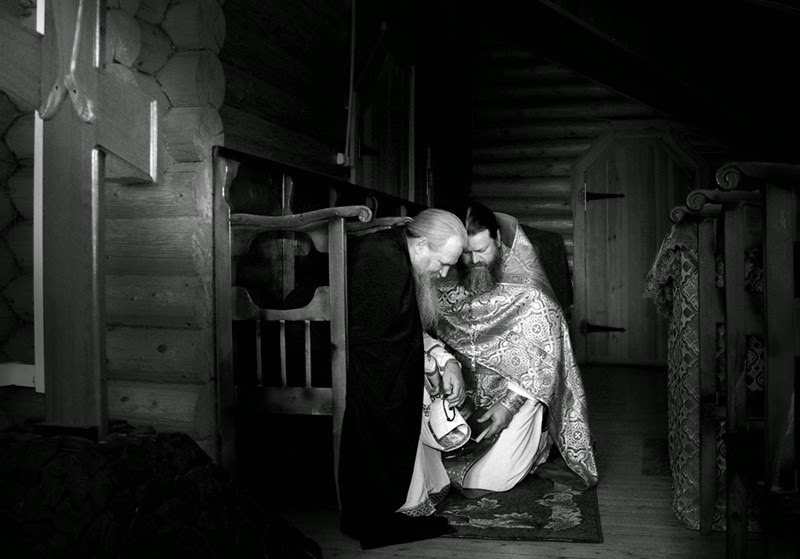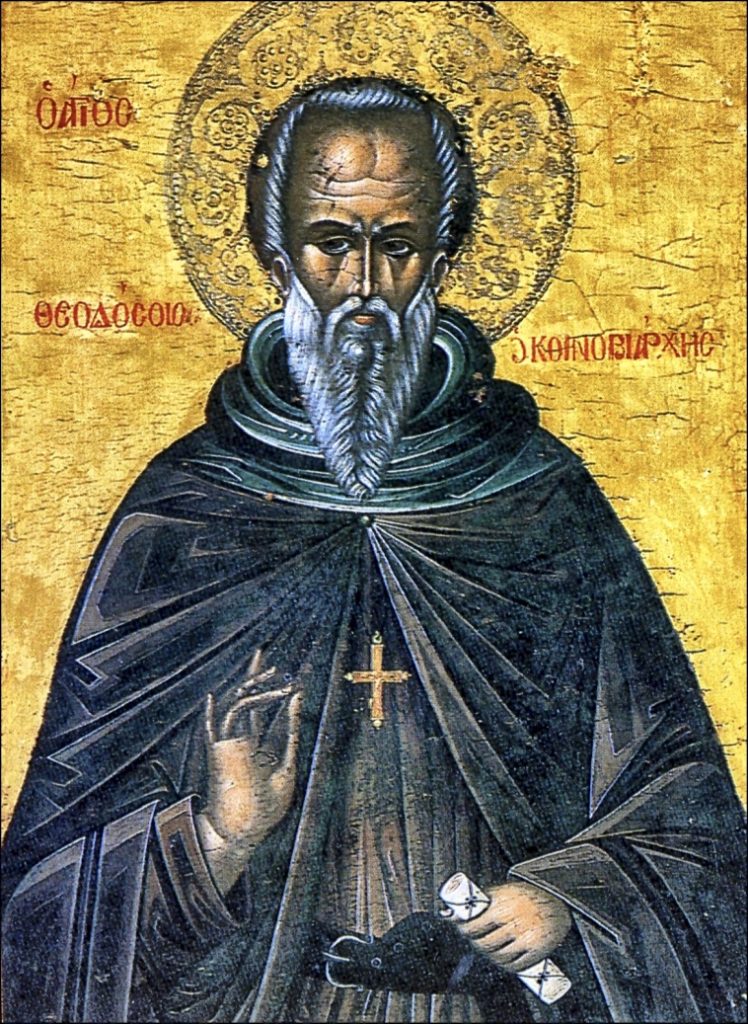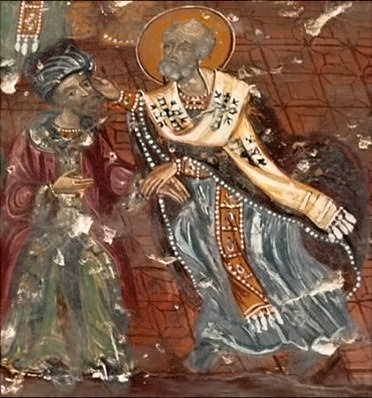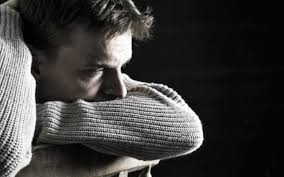2. from the life of saint Sava
Once, during the Lent, when the pious Elder Sabba withdrew in the desert to live there as he got used to, one of disciples called Jacob, a shameless man from Jerusalem showed openly the baseness of his thought. He attracted on his side other monks as mindless as he was and began to build their own Lavra in the place called `the pit of the seven mouths`, erecting cells and church and making more other things that are of use in a monastery.
The brothers got frightened and they did not permit to be continued the building but that one adding lie to injustice said that everything was made after the will of elder Sabba. Thing which made the monks stop impeding him to build, but which did not drive away their annoyance, because they saw with their own eyes how it was cut a good part of the land of their Lavra. However believing that Jacob was saying the truth, they waited for the return of the Elder.
After the fasting days ended, the holy Sabba returned to the Lavra and seeing what happened sent after Jacob. He asked him kindly to stop the work because it was not in accordance with the will of God or with the thoughts of the brothers. For him was dangerous to be entrusted other souls to him before he came to his senses. The holy Father advised him in this way first gently and fatherly, but seeing that Jacob protested and had no obedience he changed his usual gentleness and said: `I think, son, that what I advised you is beneficial for you. But as long as you don’t listen take care not to learn what is beneficial for you suffering a great harm.
Saying these, he went to the tower of the monastery. And Jacob suddenly began to shiver and all his body was caught by fever. Then he fell to bed and he suffered for seven months of a terrible sickness. And when he almost lost all his hope of living, remembering the disobedience he had showed towards abba Sabba asked the people surrounding him to lift him up with his bed and take him to the great Elder and lay him down to his holy feet. `So that he may forgive my disobedience for not dying this life in this way, unforgiven by him. They did that and Jacob was taken from there lying in bed and the one who was gentle and merciful looked at him kindly and said: `Did you see, brother, what is the fruit of your own will? Did you learn it enough? Did you understand what is the reward of the disobedience and insubordination?` Opening his mouth with difficulty because his lips were heavy because of his sickness, Jacob said: `Forgive me, holy father, cause now I am leaving for my last journey.` And that one said: May God forgive you, brother.` Saying that he gave him his hand and his hand – oh, wondrous thing! – gave power to the sick man who got up.` Then the Elder gave him the Holy Eucharist and after that divine food followed the earthly one. He ate, he recovered and proved to be healed in a wondrous way, getting up from his bed easier than the healthy ones.
He took as canon for his disobedience not to return to the new buildings. But the Patriarch of Jerusalem, Elijah, hearing what had happened thought it was not unacceptable to let them intact and sent immediately to be destroyed completely.
Then the holy Sabba wanting to show that Jacob was obedient entrusted to him the serving of the worshipers hosted by the Lavra. Once it happened that he cooked some beans.[2]
And as he was unexperienced in cooking, he made a bigger quantity than it was needed which could have been enough even for three days. But on the following day Jacob threw as trash in the spring near the Lavra all the beans left. This thing did not remain unknown to blessed Sabba, since as the Scripture says: The wise has his eyes open.[3]. He went immediately without being seen by anyone, he collected the thrown beans, left them to dry in the sun for a while and then collected them again. After some time saint Sabba called Jacob alone to have supper with him. And cooking skillfully the bean thrown in the spring served it to him as a tasty dish. While eating blessed Sabba wanting to put Jacob to a test said: Forgive me, brother, but maybe I did not serve you such a good dish as I wished, because I don’t know how to cook tasty savory food.
. But Jacob answered that he liked that very much and it had been a long time since he had eaten such a good dish.
Then great Sabba added: `Now, my son, that these are the beans you have thrown not so long ago as useless in the spring. May this be a good opportunity for you to meditate: How could someone rule wisely his brothers when he is not able to appreciate that well a dish so that it can be as much as it’s needed and not more? And not inappropriately the Elder told him the word of the Apostle: If anyone does not know how to manage his own family, how can he take care of God’s church?4]
He said these and many other things of this kind to Jacob, advising him to be economize things and rebuking him for his mistake in order to help him free himself of such a passion. Then after prayer and blessing he let him leave.
After a long time, while resting in his cell, Jacob was terribly troubled by shameless carnal thoughts and a great disturbance was aroused inside him because of his lust. He stood against that bravely for a long time but afterwards looking at the sea of temptations thought that it’s agitation would never cease – and undoubtedly the thought was from the evil one, one of his cunnings and of his sly oppressions. He lost his mind and forgot about the holy canons[5], he took a knife and cut his genitals healing the evil with evil in an evil way. Not enduring the pain and the bleeding he called those who were in the neighbourhood calling them to help him. They ran immediately and seeing the terrible thing he had done to himself, helped him with remedies as much as they could soothing his pain. The rumor about this happening reached saint Sabba. And after Jacob’s pain was eased he expelled him from the Lavra because he had made himself an enemy and a sly suicide. Because of this, Jacob began to feel a deep remorse that tormented his soul and made him shed bitter tears and sigh from the bottom of his heart. And it was indeed a miserable sight causing the pity of those who saw him.
Being in that situation he went to blessed Theodosius and confessed to him his terrible carnal struggles telling him the harm he did to himself and crying because he was expelled from the Lavra. And Theodosius felt sorry for him and going together to blessed Sabba asked him to forgive the brother and receive him back in the Lavra giving him an appropriate canon. Sabba gave in to the requests of his friend – his natural mercy prevailing above anything else – and he received Jacob. And he gave him other orders, among them being not to speak or see anyone, except for the one who was to serve him what was needed. Thus Jacob found himself back in his cell, showing much repentance and praying fervently to God until his sin would have been forgiven. And how this happened it will be related as follows.
Once this holy elder Sabba had a vision with a bright man who spread sweet rays of lights. He stood near him and pointed to him a corpse thrown at Jacob’s feet and Jacob praying to God for the corpse. Then it was heard a voice from above saying:
`Jacob, your prayer was heard, touch the corpse and it shall be revived. And Jacob touched the dead as he was told and that one was revived. That bright man looked at abba Sabba and explaining quickly the vision said that he wanted to get out of the cell and call Jacob, asking him to attend from that moment on the holy services. Thus Jacob came to the church, gave the brothers a Christian kiss and then went t blessed Theodosius who gave him an embrace too. And seven days after that vision he died happily.
_____________________
[1] It was a habit of many monks from Palestine to withdraw in the desert at the beginning of the Great Lent for a more severe ascetic strife, returning at the monastery on the Palm Sunday.
[2] Textually: bean dish
[3] Ecc. 2,14.
[4] 1 Tim. 3,5.
[5] The holy canons judge very severely the castration and order the defrocking or damnation of the one who does it, calling him self murderer and enemy of the divine creation. See the Canons 22,23 and 24 of the Holy Apostles and the 8th Canon of the 9th Ecumenical Council from Constantinople (Archimandrite Prof. Dr. Ioan D. Floca, The Canons of the Orthodox Church, Sibiu, 1993).
Excerpt from EVERGHETINOS – first edition 2007 Great Holy Monastery Vatoped vol. I, Theme 20 – Metropolis Press Publishing, Athens, Greece, 2007.





